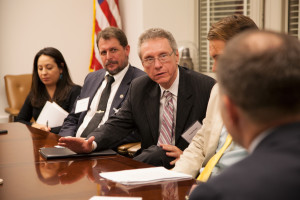The Obama administration reversed course and announced yesterday there won’t be any oil rigs off the Southeast Atlantic coast for at least five years, thanks to protests in states ranging from Virginia to Florida.
Objections to offshore drilling by the Pentagon and by almost 110 coastal communities in Virginia, North Carolina, South Carolina, Georgia, and Florida factored into the reversal, said the Department of Interior Secretary Sally Jewell in a statement March 15.
That will come as a great relief to 30 coastal communities in Florida that have passed resolutions opposing offshore drilling and seismic airgun testing after the administration said a couple of years ago it would allow it as part of its new 5-year energy plan.
It was also opposed locally by groups like the Surfrider Club and Oceana, an international advocacy group who galvanized protesters.
“As a Floridian and coastal resident, I thank President Obama for protecting our treasured ocean and beaches,” said Erin Handy, Oceana’s Florida campaign organizer. “[We] are united by a sense of pride and stewardship for our ocean and the sea turtles, dolphins, whales and other marine life that call it home.”
But the battle might not be over.
While yesterday’s announcement closes the area to drilling leases, seismic airgun testing is still allowed. There are nine seismic testing permit applications in the Southeast and four off the coast of Florida. Whether contractors will now abandon permit applications or continue pursue the hunt for oil and gas deposits in the hopes drilling will be allowed in five years remains to be seen.
Fernandina Beach and St. Augustine mayors Johnny Miller and Nancy Shaver have opposed both offshore drilling and seismic testing. Miller is a retired sonar specialist with the United States Navy who said he spent his career using sound to locate submarines.
“I’ve learned that sound is everything to animals like dolphins and whales,” he said in a statement released by Oceana.

Miller and coastal leaders from Virginia to Florida went to Washington, D.C. in November to meet with administration officials to urge them to drop area offshore drilling from the energy plan. One hundred members of Congress, including 10 from Florida have opposed seismic airgun testing.
All of Florida’s democratic elected officials opposed airgun testing as have four republicans, including Rep. Ron DeSantis (R – FL 6th District). U.S. Sen. Bill Nelson (D – FL) opposed it because of danger an offshore drilling accident could pose to Northeast Florida’s military facilities. Airgun testing, used to locate undersea oil and gas deposits, is considered a first step toward offshore drilling, according to Nelson’s website.
The Florida Department of Environmental Protection (DEP) had also expressed concern to the federal agency in charge of the plan about the “lack of data and information concerning the effects.”
In July, the Jacksonville City Council failed to pass a resolution opposing seismic testing in a 9 – 9 vote, although other area municipalities had done so. As reported by Florida Field Notes, proponents of the resolution stood with the DEP in wanting further studies. Those voting against it were concerned the vote would hurt Jacksonville’s chances for further developing its energy sector.
The heart of the dispute has been a difference in opinion between the government’s assessment of risk from seismic airgun testing and that of marine industry scientists. The Bureau of Ocean Energy Management (BOEM) said there was no evidence of damage to marine life and that seismic airgun testing has been used for 30 years.
But 75 marine scientists from the international community disagreed, including two from Florida Atlantic University. In a letter to President Obama March 2015, the group said the effect on right whales, sea turtles, scallops, and commercial species hasn’t been studied thoroughly. It said there could be geographic disbursement to the commercial species, and foraging and reproduction impacts on other species that wouldn’t be known until the harm is already done.
Advocates are calling yesterday’s announcement a success for bipartisan, public advocacy. Oil industry spokespersons called the public and government groups “fringe constituencies” and “extremists.”

